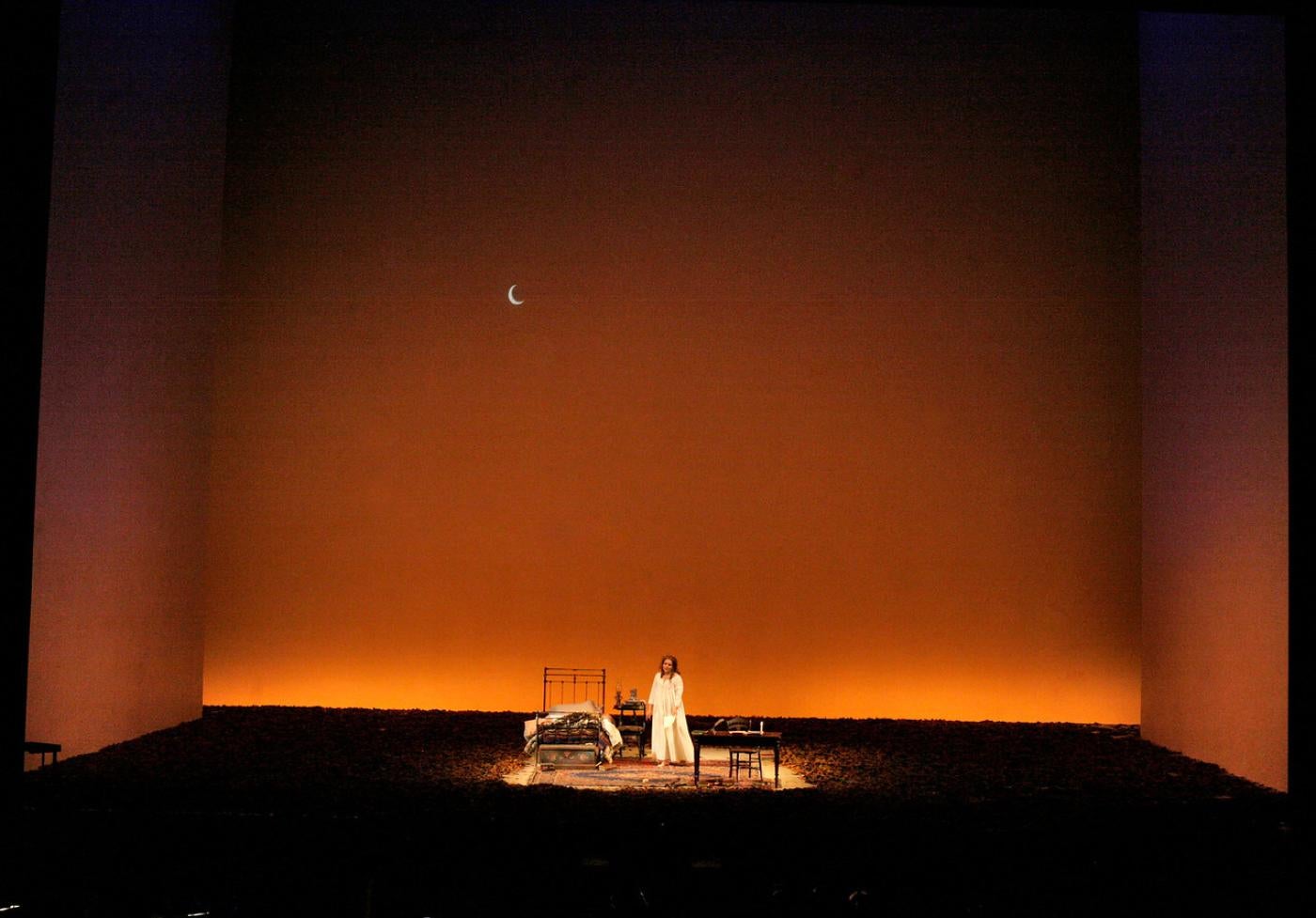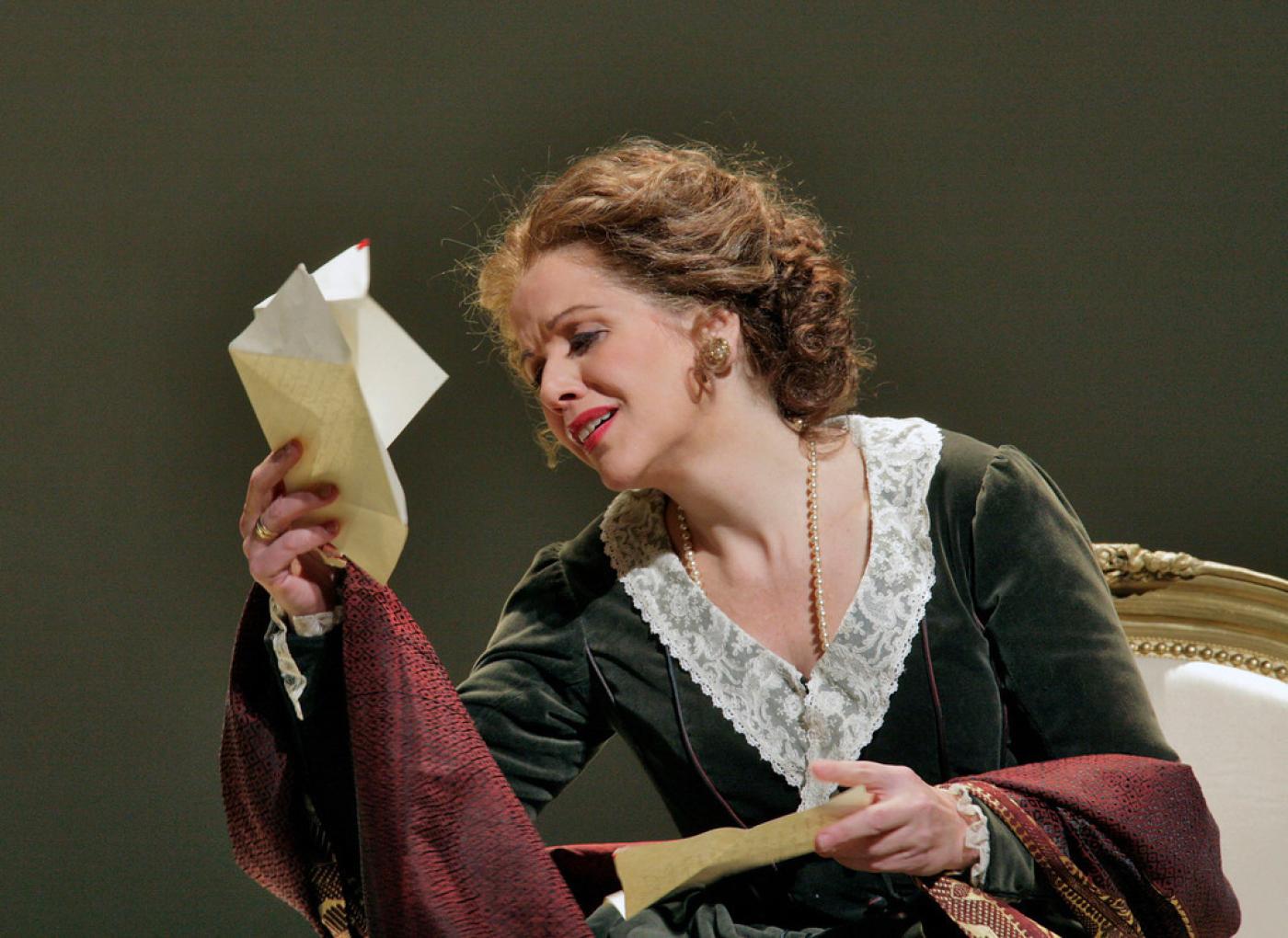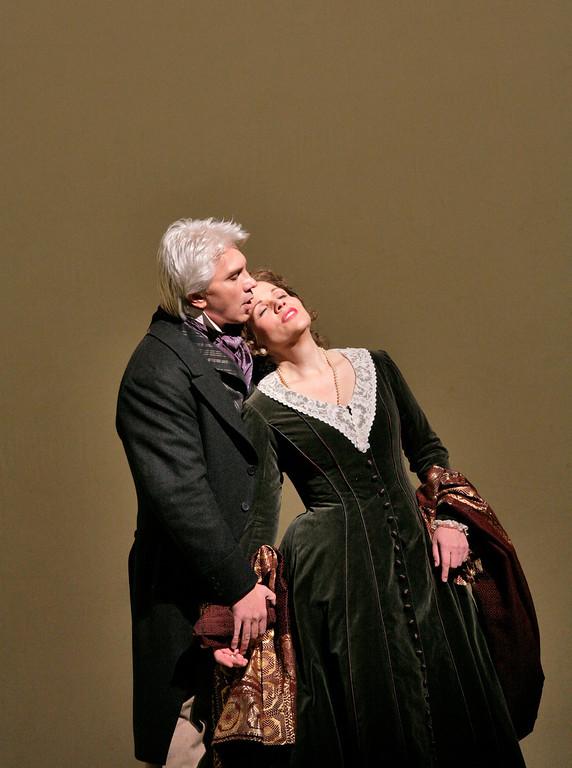Have you had the chance to experience opera presented on a theatrical screen with HD sound? It’s large opera, up close and quasi-personal, that engages us with riveting visuals and sound. Such are the Metropolitan Opera live HD theater broadcasts.
On August 16, 2023, the Met offers a repeat performance of its 2007 HD theater presentation of Pyotr Ilyich Tchaikovsky’s masterpiece, Eugene Onegin, to selected movie theaters in the Washington, D.C. area. WETA Classical is pleased to offer an opportunity to win free tickets to this performance that featured two opera superstars in the principal roles: the late baritone Dmitri Hvorostovsky and soprano Renée Fleming. There are a limited number of tickets, so please keep an eye on Facebook, Instagram and Twitter from August 7 through 11 for your chance to win!
It’s fitting that the Met selected this particular performance of this particular opera. Tchaikovsky composed 11 operas, but Eugene Onegin is deservedly the most popular and one that remains a staple in the repertoire of opera houses. I first saw Eugene Onegin in a Metropolitan Opera production and was profoundly affected by the interplay of drama and music. It’s become one of my favorites.
Although the libretto was written by Konstantin Shilovsky, Pyotr Tchaikovsky and Modest Tchaikovsky, the basis of the story is the narrative verse, Eugene Onegin, by the great Russian writer, Alexander Pushkin. The opera’s libretto retains some of Pushkin’s verse. (Pushkin’s work also inspired other operas, such as Tchaikovsky’s The Queen of Spades, Mussorgsky’s Boris Godunov, Glinka’s Ruslan and Lyudmila, and Rimsky-Korsakov’s The Tale of Tsar Saltan, among others.) The opera premiered at the Moscow Conservatory in 1879.
Letters play an important role in Pushkin’s tale and the circumstances leading to Tchaikovsky’s work. He had been asked several times to compose an opera on Pushkin’s tale, but always declined, maybe fearing he couldn’t match the mastery of Pushkin. At one point, Tchaikovsky received a letter from a female student who expressed her love for him. Tchaikovsky was not inclined to pursue the relationship, but ultimately married her. It was a disastrous union that resulted in a quick separation. Around this time, Tchaikovsky began a letter friendship with Nedezhda von Meck, a wealthy woman who became his patron. And, as fates would have it, around this time Tchaikovsky read Pushkin’s Eugene Onegin and became deeply moved by the famous Letter Scene, which sets the story in motion. It was this scene, which involves a selfless and vulnerable outpouring of emotion, that led Tchaikovsky to compose the opera. Some scholars believe that Tchaikovsky identified with the heroine, Tatyana.
The story is a sorrowful depiction of how a man’s selfish and cavalier attitude leads to lost love and friendship. The opera takes place in 19th century St. Petersburg and surrounding rural Russia. Two sisters, Tatyana and Olga, are at their country estate when Olga’s fiancé, Lensky, arrives with his friend, Eugene Onegin. Tatyana is instantly attracted to Onegin, but too shy to show it. That night, after the guests have left, Tatyana confesses her love in a letter to Onegin. This poignant “Letter Scene” showcases Tchaikovsky’s gift for crafting emotional drama with sensitive lyricism. Tatyana eagerly awaits Onegin’s response, but is crestfallen when he explains that he has no temperament for love and can only give her brotherly affection. He cautions Tatyana to be more careful in displaying her emotions.
Later, at a party given for Tatyana, Onegin grows restless and flirts with Olga, inciting Lensky’s jealousy and anger. The men quarrel; Lensky renounces his friendship with Onegin and challenges him to a duel. Early the next morning, while waiting for Onegin to appear for the duel, Lensky reflects on his happy life and love for Olga in an intimate outpouring, “Where have you gone, o golden days of my spring?”. Each man senses the foolishness of the duel, but neither has the courage to stop it. Onegin shoots and kills Lensky.
The third and pivotal Act of Eugene Onegin takes place five years later. Onegin has spent the ensuing years traveling in Europe. Now, at a grand ball, he stands alone, reflecting on his loneliness and the sorrowful events that led to Lensky’s death. He is shocked when he sees Tatyana, now a grand and regal beauty, enter with her husband. She in turn recognizes Onegin but holds back emotion. Her husband, unaware that his wife and Onegin know each other, tells Onegin of his deep love for Tatyana. Onegin realizes he is in love with Tatyana and writes her a letter asking for a meeting. Tatyana reluctantly agrees to meet him; seeing him has disturbed her and awakened feelings for him.
Their final meeting is powerful and replete with emotion: Tchaikovsky’s carefully crafted music mirrors the lovers’ struggle as Onegin implores Tatyana to accept him, leave her husband and go away with him, but Tatyana remains conflicted. Although they acknowledge their mutual love, Tatyana ultimately rejects Onegin out of loyalty to her husband. Onegin begs her to reconsider, but she walks away from him, leaving him to emit a loud cry of despair amid explosive orchestration.
This is an opera that captivates us, from start to finish, with its deep range of emotions so sensitively expressed by Tchaikovsky’s intimate, opulent and power music. He needn’t have worried about doing Pushkin’s work justice.
Visit Facebook, Instagram and Twitter between August 7 and 11 for your chance to win tickets to this stellar performance.
Learn more about the life and music of Tchaikovsky
PBS PASSPORT
Stream tens of thousands of hours of your PBS and local favorites with WETA+ and PBS Passport whenever and wherever you want. Catch up on a single episode or binge-watch full seasons before they air on TV.


